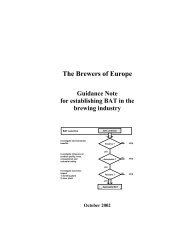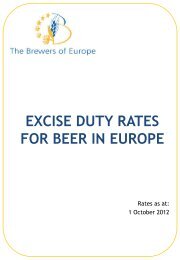Beer Consumption The Benefits of Moderate - The Brewers of Europe
Beer Consumption The Benefits of Moderate - The Brewers of Europe
Beer Consumption The Benefits of Moderate - The Brewers of Europe
Create successful ePaper yourself
Turn your PDF publications into a flip-book with our unique Google optimized e-Paper software.
Potential benefit from the natural<br />
ingredients in beer<br />
Vitamins and antioxidants could also be protective<br />
• Scientists who have studied the reduced risk <strong>of</strong> coronary heart disease in beer drinkers<br />
report that the reduction in risk is greater than would be expected from the alcohol alone<br />
and speculate that other factors in beer such as vitamins and antioxidants could also be<br />
protective34 .<br />
• Research is also being conducted into the properties <strong>of</strong> alcohol-free beer. <strong>The</strong> results so far<br />
indicate that the potential beneficial effects from the natural ingredients are likely to apply<br />
equally to this type <strong>of</strong> beer35 .<br />
• Antioxidants<br />
<strong>Beer</strong> contains natural antioxidants which may<br />
have a positive health effect<br />
• Natural antioxidants are found in fruits, vegetables and cereals. <strong>The</strong>y are present<br />
in beer, where they come from both the malt (barley) and hops as ingredients36 .<br />
<strong>The</strong> total amount <strong>of</strong> antioxidants in beer will depend on the style <strong>of</strong> beer and<br />
therefore the raw materials and the brewing process used.<br />
• Per drink (<strong>of</strong> equivalent alcohol content), beer contains more than twice<br />
as many antioxidants as white wine, although only half the amount in red wine37 .<br />
However, many <strong>of</strong> the antioxidants in red wine are large molecules and may be<br />
less readily absorbed by the body than the smaller molecules found in beer.<br />
Research has shown that the antioxidant content <strong>of</strong> blood is raised following<br />
beer consumption suggesting that the antioxidants in beer are readily absorbed38 and perhaps more readily than that from solid foods39 .<br />
• <strong>The</strong> health significance <strong>of</strong> antioxidants is that they may play a role in the protection<br />
against cancer through their action against free radicals40 . <strong>The</strong>y are also thought to<br />
reduce the risk <strong>of</strong> heart attacks by inhibiting blood clotting41 . Thus the anti-oxidants<br />
in beer may have a positive health effect on the consumer.<br />
14 <strong>The</strong> <strong>Benefits</strong> <strong>of</strong> <strong>Moderate</strong> <strong>Beer</strong> <strong>Consumption</strong><br />
• Vitamins and minerals<br />
<strong>Beer</strong> provides a rich source <strong>of</strong> dietary folate and silicon<br />
• As well as adding to a healthy diet, the vitamins and minerals in beer may confer additional<br />
health benefits.<br />
• Recent research suggests that the B vitamins (B6 and B9) may give beer drinkers additional<br />
protection against cardiovascular disease compared to drinkers <strong>of</strong> wine or spirits42-43 . For example<br />
vitamin B9 may help to reduce the levels <strong>of</strong> homocysteine in the blood. High homocysteine<br />
levels, like "bad cholesterol" (LDL), are associated with a higher risk <strong>of</strong> heart attacks. Research<br />
in a predominantly beer drinking population in Wales concluded that drinking beer, in contrast to<br />
other alcoholic drinks, may moderate homocysteine levels as a result <strong>of</strong> its high folate content44 .<br />
Another study in the beer drinking population <strong>of</strong> the Czech Republic found that consumption <strong>of</strong><br />
one litre <strong>of</strong> beer a day was associated with lower blood homocysteine levels45 . Clinical research is<br />
underway to examine whether the folate in beer can reduce homocysteine levels.<br />
• It has been suggested that adequate dietary folate (B9) could protect against some cancers by<br />
protecting the DNA from the type <strong>of</strong> damage that can cause cancer46 .<br />
• <strong>Beer</strong> is also an excellent source <strong>of</strong> dietary silicon which is readily absorbed by the body.<br />
This silicon comes from the barley and is released during the brewing process47 . Silicon is<br />
associated with healthy bones and has been shown in laboratory (animal) experiments to<br />
increase bone mineral density when taken orally48 . Research is underway which will<br />
investigate whether the dietary silicon provided by moderate beer consumption actually<br />
protects against osteoporosis. This may explain in part the protective effect on bones reported<br />
for alcoholic drinks in general (see page 11 above).<br />
• Hops<br />
Possible health benefits - unique to beer<br />
• Small quantities <strong>of</strong> the flowers from hops are used to preserve and flavour beer.<br />
• Hops are not used in other alcoholic drinks so any potential health benefits they have are<br />
unique to beer.<br />
• Many studies have shown that the flavonoids in hops, have the potential to protect against some<br />
diseases and help fight some types <strong>of</strong> cancer49 . Most <strong>of</strong> this research has been done in the laboratory<br />
but additional research is planned to investigate the potential effects in animals and people.<br />
• Hop flavonoids can be shown to be present in beer50 but as yet their effect on human health is not<br />
fully understood.<br />
15











